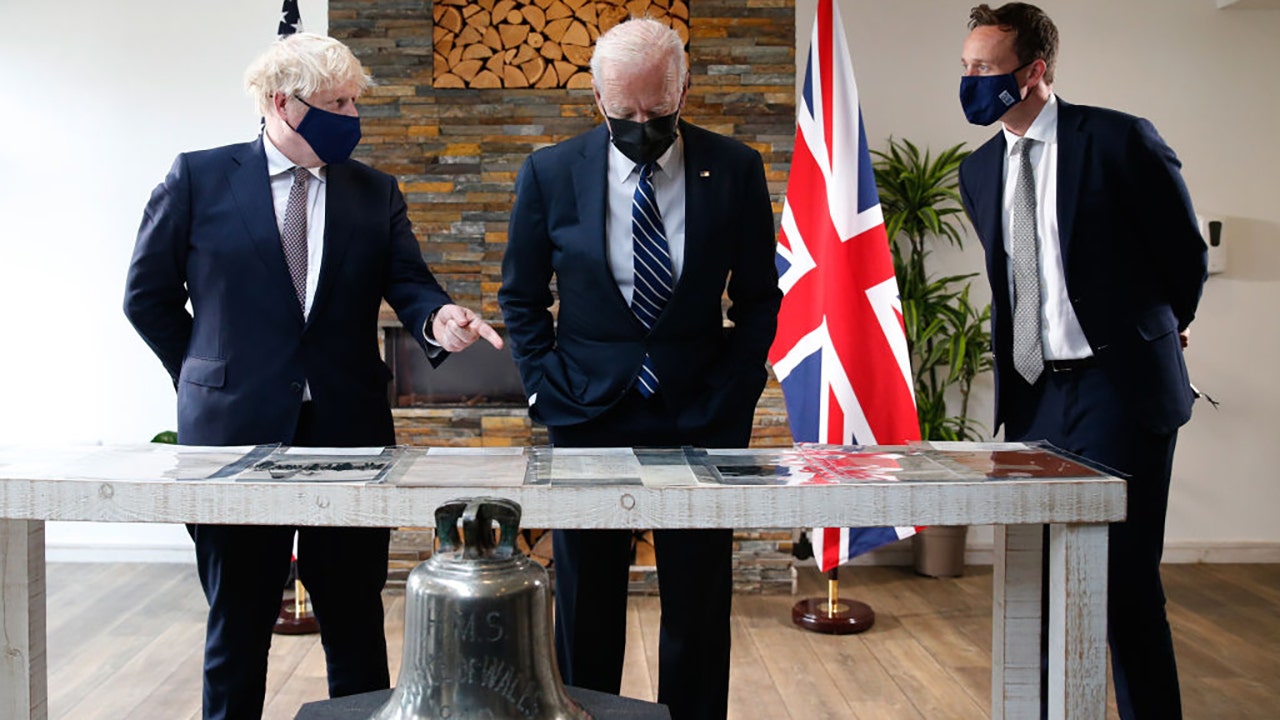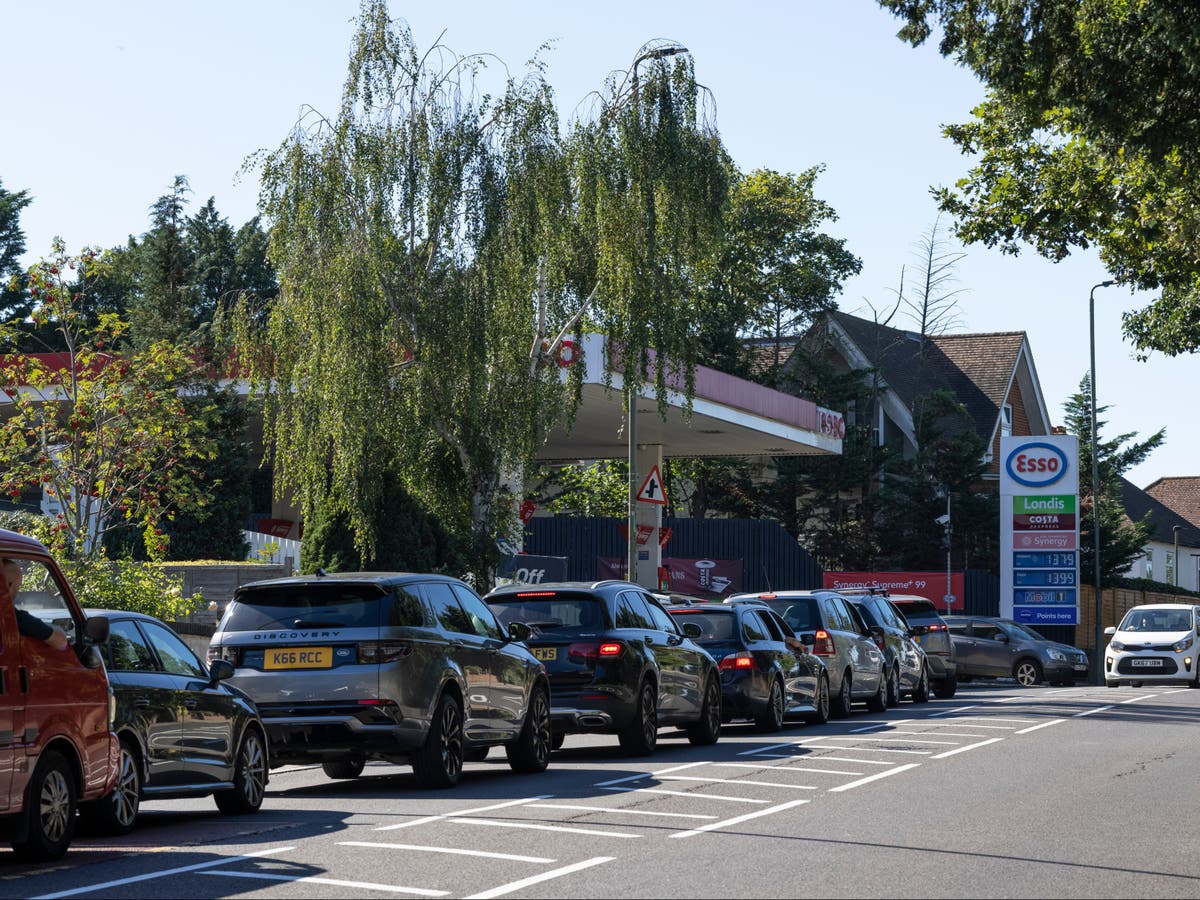Russia-Ukraine war live: Ukraine has penetrated Russian lines in some areas, says UK | Ukraine
Ukraine has penetrated Russian lines in some areas, says UK
The latest intelligence update from the UK’s Ministry of Defence said over the past 48 hours “significant” Ukrainian operations have taken place in several sectors of eastern and southern Ukraine.
Ukrainian forces have “likely made good progress” and “penetrated the first line of Russian defences”, the MoD added. However, in other areas “Ukrainian progress has been slower”.
Meanwhile, Russian performance has been “mixed”, with some units “likely conducting credible manoeuvre defence operations while others have pulled back in some disorder, amid increased reports of Russian casualties as they withdraw through their own minefields”.
The update added: “The Russian Airforce has been unusually active over southern Ukraine, where the airspace is more permissive for Russia than in other parts of the country. However, it remains unclear whether tactical airstrikes have been effective.”
Key events
Please turn on JavaScript to use this feature
Here are some images coming to us from the wires.
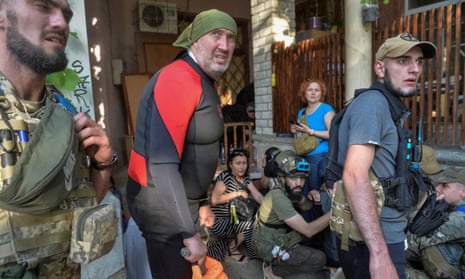
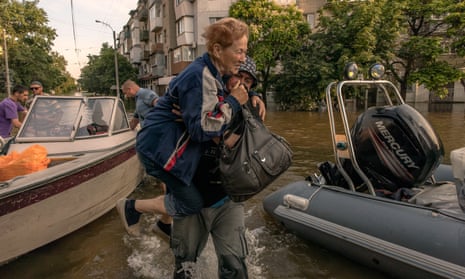

The southern reach of the Dnipro River is likely to return to its banks by 16 June after the breach of Ukraine’s Kakhovka dam this week, a Russian-installed official said on Saturday.
Vladimir Saldo, who heads the Russian-controlled part, said the water level at Nova Kakhovka, the town adjacent to the dam on the downstream side, had now dropped by 3 metres (10 feet) from Tuesday’s peak, Reuters reported.
“The pumping of water and garbage collection from the streets have started,” he said, adding that more than 6,000 people had been evacuated from the flooded districts of Nova Kakhovka and from Oleshky and Hola Prystan.
He said preliminary calculations by the Russian hydroelectricity producer RusHydro indicated the Dnipro would return to its usual course below the now-destroyed Kakhovka power station by 16 June.
This could not be independently verified.
Here’s more from Prof Snyder.
When asked whether he believed the counteroffensive would make good progress, he said:
Military history teaches us that these things are very, very difficult to predict, but I think a lot of it hangs on, just as it does generally in war, whether the Ukrainian advances generate political pressure in Moscow and whether that political pressure leads back towards panic in the Russian front lines.
I think in general, the Ukrainians have done better than people expect, and I would cautiously predict that they will do better than people expect this time as well.
Yale historian Prof Timothy Snyder, who has written about Ukraine and Russia, and also about tyranny and the erosion of democracy, said he did not believe the destruction of the Kakhovka dam would ultimately affect Ukraine’s counteroffensive.
He told BBC Radio 4’s Today programme:
I don’t think … it will have fundamental implications for the Ukrainian counteroffensive for now.
It’s diverting Ukrainian soldiers. Ukrainian soldiers are evacuating people. Ukrainian soldiers are using their drones to drop water onto roofs instead of grenades into Russian tanks.
I think that will make a difference for a few days or a few weeks, but I think there are plenty of other directions the Ukrainian counteroffensive was meant to take, and remarkably, it’s still taking those.
He added it was “remarkable” that Ukraine is able to carry out a counteroffensive and a rescue operation at the same time.
Ukraine has penetrated Russian lines in some areas, says UK
The latest intelligence update from the UK’s Ministry of Defence said over the past 48 hours “significant” Ukrainian operations have taken place in several sectors of eastern and southern Ukraine.
Ukrainian forces have “likely made good progress” and “penetrated the first line of Russian defences”, the MoD added. However, in other areas “Ukrainian progress has been slower”.
Meanwhile, Russian performance has been “mixed”, with some units “likely conducting credible manoeuvre defence operations while others have pulled back in some disorder, amid increased reports of Russian casualties as they withdraw through their own minefields”.
The update added: “The Russian Airforce has been unusually active over southern Ukraine, where the airspace is more permissive for Russia than in other parts of the country. However, it remains unclear whether tactical airstrikes have been effective.”
Russia has fired missiles and attack drones at the central Ukrainian region of Poltava overnight, inflicting “some damage of infrastructure and equipment” at the Myrhorod military airfield, according to the regional governor.
The attack using ballistic and cruise missiles also damaged eight private residential homes and several vehicles, but no casualties were reported.
– Reuters
German investigators are examining evidence suggesting a sabotage team used Poland as an operating base to damage the Nord Stream pipelines in the Baltic Sea in September, the Wall Street Journal reported.
Investigators have fully reconstructed the two-week voyage of the “Andromeda”, a white pleasure yacht suspected of being involved in damaging the pipelines that supply Russian gas to Europe.
It was pinpointed the yacht had deviated from its target to venture into Polish waters, using data from the Andromeda’s radio and navigation equipment, satellite and mobile phones, Gmail accounts “and DNA samples left aboard, which Germany has tried to match to at least one Ukrainian soldier”.
Germany’s Federal Criminal Police Office and Poland’s Office of Chancellery of the prime minister did not immediately respond for comment.
The Washington Post reported this week that the US had learned of a Ukrainian plan to attack the pipelines three months before they were damaged by the underwater explosions. Ukrainian president Volodymyr Zelenskiy told German media that Ukraine did not attack Nord Stream pipelines.
Here are some of the latest images from Ukraine:
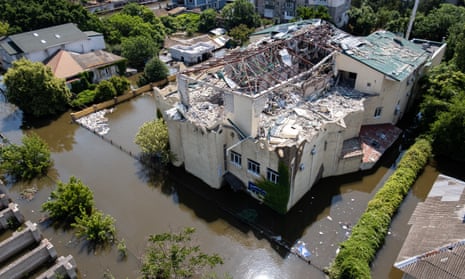
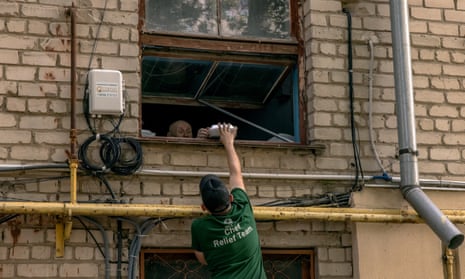

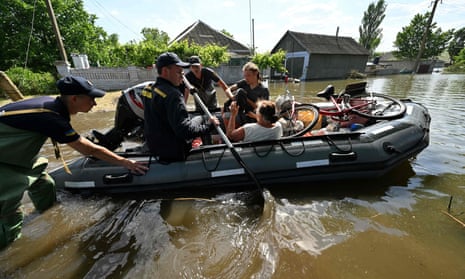
Three killed and at least 10 injured in attack on Odesa region
A drone attack by Russian forces has killed three people and injured at least 10 more in Ukraine’s Odesa oblast region in the early hours of Saturday morning, according to Ukraine’s southern command.
Debris from the attack hit a high-rise residential building, causing a fire that has been extinguished. The blast wave also damaged surrounding residential buildings.
Emergency services said 27 people, including three children, were wounded, but the fire had been rapidly put out and 12 people were rescued from the building.
Russian forces used Iranian-made drones to attack the region, all of which were shot down by Ukrainian forces, according to reports.
The UN has helped boost Russian exports of food and fertilisers, facilitating a steady flow of ships to its ports ahead of an important grain deal deadline.
Top UN trade official Rebeca Grynspan met with Russia’s deputy foreign minister Sergei Vershinin as Moscow threatens to walk away from a deal allowing the safe export of food and fertiliser from Ukraine’s Black Sea ports on 17 July if obstacles to its own shipments are not removed.
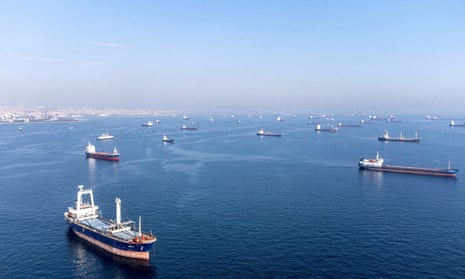
To convince Moscow to agree to the pact known as the Black Sea Grain Initiative – brokered by the UN and Turkey in July last year – a three-year agreement was struck at the same time under which UN officials agreed to help Russia with its own food and fertiliser exports.
UN spokesperson Stephane Dujarric said “the past months have shown tangible progress” on improving Russian exports, but added: “Challenges remain but we will spare no effort to overcome all remaining obstacles.”
Russia’s ambassador to Turkey said that while Moscow continues talks with the UN on the Black Sea grain deal, there are no grounds to extend it beyond 17 July.
The Wagner group has been accused of stoking “anarchy” on Russia’s frontlines after one of the Kremlin’s military commanders claimed Yevgeny Prigozhin’s mercenaries had kidnapped and tortured his soldiers during the battle for Bakhmut.
In a video posted online, Lt Col Roman Venevitin also accused Wagner soldiers of stealing arms, forcing mobilised soldiers to sign contracts with Wagner, and attempting to extort weapons from the Russian defence ministry in exchange for releasing kidnapped soldiers.
For more details, here’s the full story:
Russia and Ukraine are tussling over control of Ukraine’s counteroffensive narrative as both Moscow and Kyiv reported heavy fighting in the south-central Zaporizhzhia region.
Russian president Vladimir Putin confirmed the Ukrainian offensive had begun but said the troops “did not achieve their goals in any sector”. Ukraine’s president Voldymyr Zelenskiy did not make direct reference to developments in the battlefield but praised his soldiers’ “heroism”.
While some bloggers have described the first sightings of German and US armour signalling that the Ukrainian counteroffensive was under way, there’s virtually no independent reporting from the frontlines.
Ukraine’s counteroffensive is ultimately expected to involve thousands of troops trained and equipped by the west. The US announced an extra $2.1bn in security assistance on Friday, including air defence and ammunition.
Ukraine’s humanitarian crisis ‘hugely worse’ after Kakhovka dam rupture, says UN aid chief
UN’s top aid official Martin Griffiths has warned Ukraine faces a “hugely worse” humanitarian situation than before after the collapse of the Kakhova dam.
This is a viral problem. The truth is this is only the beginning of seeing the consequences of this act.
Griffiths says an “extraordinary” 700,000 people are in need of drinking water and the flooding of agricultural land in one of the world’s most important breadbaskets will cause a “cascade of problems”, including lower grain exports, higher food prices around the world, and less to eat for millions in need.
Working mainly through Ukrainian aid groups, the UN has reached 30,000 people in flooded areas under Ukrainian control. Griffiths said he met with Russia’s UN ambassador for access to Russian-controlled areas in order to help flood victims.
Rescue people.
Deliver aid.
Address the ecological and economic consequences.Speaking to @UN_News_Centre, @UNReliefChief outlines the top priorities following the dam destruction in #Ukraine.
The overall message to those affected?
“We stand by you.”— UN Humanitarian (@UNOCHA) June 9, 2023
Opening summary
Welcome back to our continuing coverage of the war in Ukraine, I’m Yang Tian bringing you the latest.
UN’s top aid official warns Ukraine’s humanitarian situation has been made “hugely worse” with the destruction of the Kakhovka dam.
Martin Griffiths said an “extraordinary” 700,000 people are in need of drinking water and flooding in one of the word’s critical breadbaskets could lead to lower grain exports and less food for millions in need.
More details shortly, in other key developments:
- Russian president Vladimir Putin said Ukraine had begun its counteroffensive against Russian troops but that efforts “so far have failed” after Moscow said it repelled several Ukrainian assaults. However, Ukrainian president Volodymyr Zelenskiy made no formal announcement of specific developments on the battlefield, but praised the “heroism” of his country’s soldiers fighting “tough battles”.
- Water levels are gradually receding in parts of southern Ukraine that were flooded after the destruction of the Kakhovka dam, according to officials. Meanwhile, evidence is growing that the dam was blown up after seismic data showed there was a blast at the site in the early hours of Tuesday. Norsar, the Norwegian Seismic Array, said signals from a regional station in Romania pointed to an explosion at 2.54am. Norsar did not draw conclusions on who was responsible.
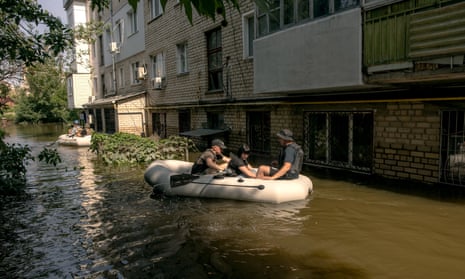
- The US said Russia appeared to be deepening its defence cooperation with Iran and had received hundreds of one-way attack drones that it is using to strike Ukraine. Citing newly declassified information, the White House said the drones were built in Iran, shipped across the Caspian Sea and then used by Russian forces against Ukraine.
- The Wagner group has been accused of stoking “anarchy” on Russia’s frontlines after one of the Kremlin’s military commanders claimed Yevgeny Prigozhin’s mercenaries had kidnapped and tortured his soldiers during the battle for Bakhmut. In a video posted online, Lt Col Roman Venevitin also accused Wagner soldiers of stealing arms, forcing mobilised soldiers to sign contracts with Wagner, and attempting to extort weapons from the Russian defence ministry in exchange for releasing kidnapped soldiers.
- Iceland announced it would suspend work at its embassy in Russia as of 1 August, the first country to do so, and asked Russia to limit its operations in Reykjavik. “The current situation simply does not make it viable for the small foreign service of Iceland to operate an embassy in Russia,” foreign minister Thordis Gylfadottir said.
- Russia will start deploying tactical nuclear weapons in Belarus after the facilities are ready on 7-8 July, Putin told his Belarusian counterpart Alexander Lukashenko on Friday in a meeting in Sochi, Russia.
- Nato allies on Friday condemned Russia’s decision to withdraw from the treaty on conventional armed forces in Europe (CFE).
- Hungary said on Friday it had received a group of Ukrainian prisoners of war from Russia, a release that Ukraine welcomed while expressing concern that it had not been informed.
- Volodymyr Zelenskiy has thanked Joe Biden for his $2.1bn (£1.6bn) security assistance package. In a tweet, Zelenskiy said the contribution is “more important than ever” since the Kakhovka dam collapse.
- The Japanese prime minister, Fumio Kishida, told Zelenskiy on Friday that Japan will offer emergency humanitarian aid worth about $5m (£3.9m) after the destruction of the Nova Kakhovka dam, a Japanese government spokesperson has said.
- Ukraine’s domestic Security Service (SBU) said on Friday it had intercepted a telephone call proving a Russian “sabotage group” blew up the Kakhovka hydroelectric station and dam in southern Ukraine. A one-and-a-half minute audio clip on its Telegram channel of the alleged conversation featured two unidentified men who appeared to be discussing the fallout from the disaster in Russian. One of the men said “Our saboteur group is there. They wanted to cause fear with this dam. It did not go according to the plan. More than they planned.”
- The Kremlin on Friday accused Ukrainian forces of killing civilian victims of flooding caused by the collapse of the Kakhovka dam in southern Ukraine in repeated shelling attacks, including one pregnant woman. Kremlin spokesperson Dmitry Peskov called the purported attacks “barbaric”. Russia did not provide any evidence to back up its claims.
- Russian deputy prime minister Marat Khusnullin said on Friday that Crimea’s water supply will not be affected by the destruction of the Kakhovka dam, and the peninsula had enough water reserves for 500 days. A canal from the destroyed reservoir fed drinking water to the peninsula. Kyiv cut access to the canal in 2014, after Russia illegally seized Crimea and claimed to annex it.


